Leadership and Management: Roles, Contexts, and Theoretical Analysis
VerifiedAdded on 2020/12/18
|11
|2635
|466
Report
AI Summary
This report delves into the realms of leadership and management, providing a comparative analysis of the roles and characteristics of leaders and managers within an organizational setting, using Unilever as a case study. It explores the functions of leaders and managers in diverse situational contexts, including conflict resolution and planning. Furthermore, the report examines various leadership theories, such as transformational leadership, classical management, situational leadership, system leadership, and contingency theory, evaluating their strengths and weaknesses. It covers the factors influencing the organizational environment and operational management approaches aimed at enhancing efficiency. The report concludes by summarizing the key findings and emphasizing the significance of effective leadership and management in achieving organizational growth and objectives.
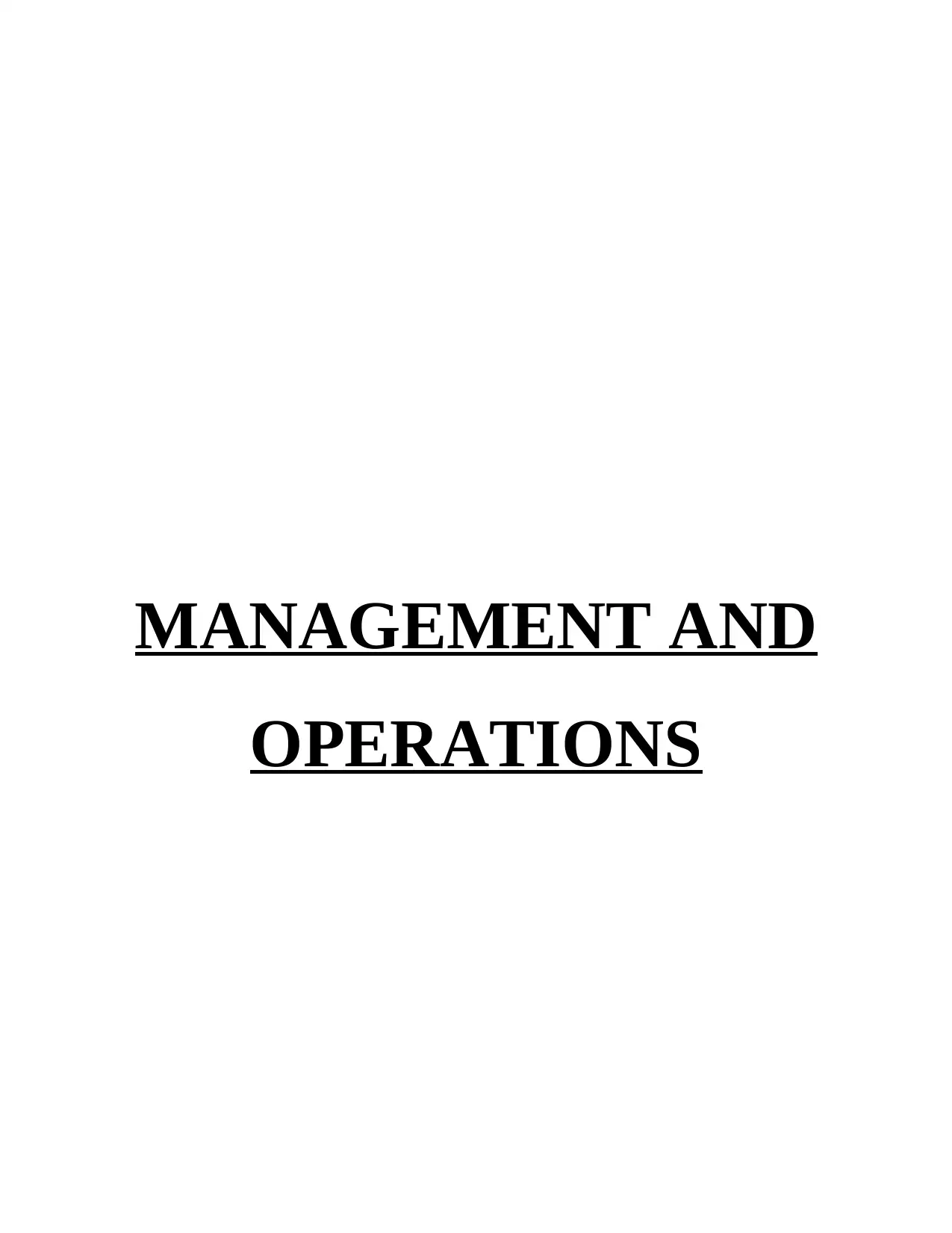
MANAGEMENT AND
OPERATIONS
OPERATIONS
Paraphrase This Document
Need a fresh take? Get an instant paraphrase of this document with our AI Paraphraser
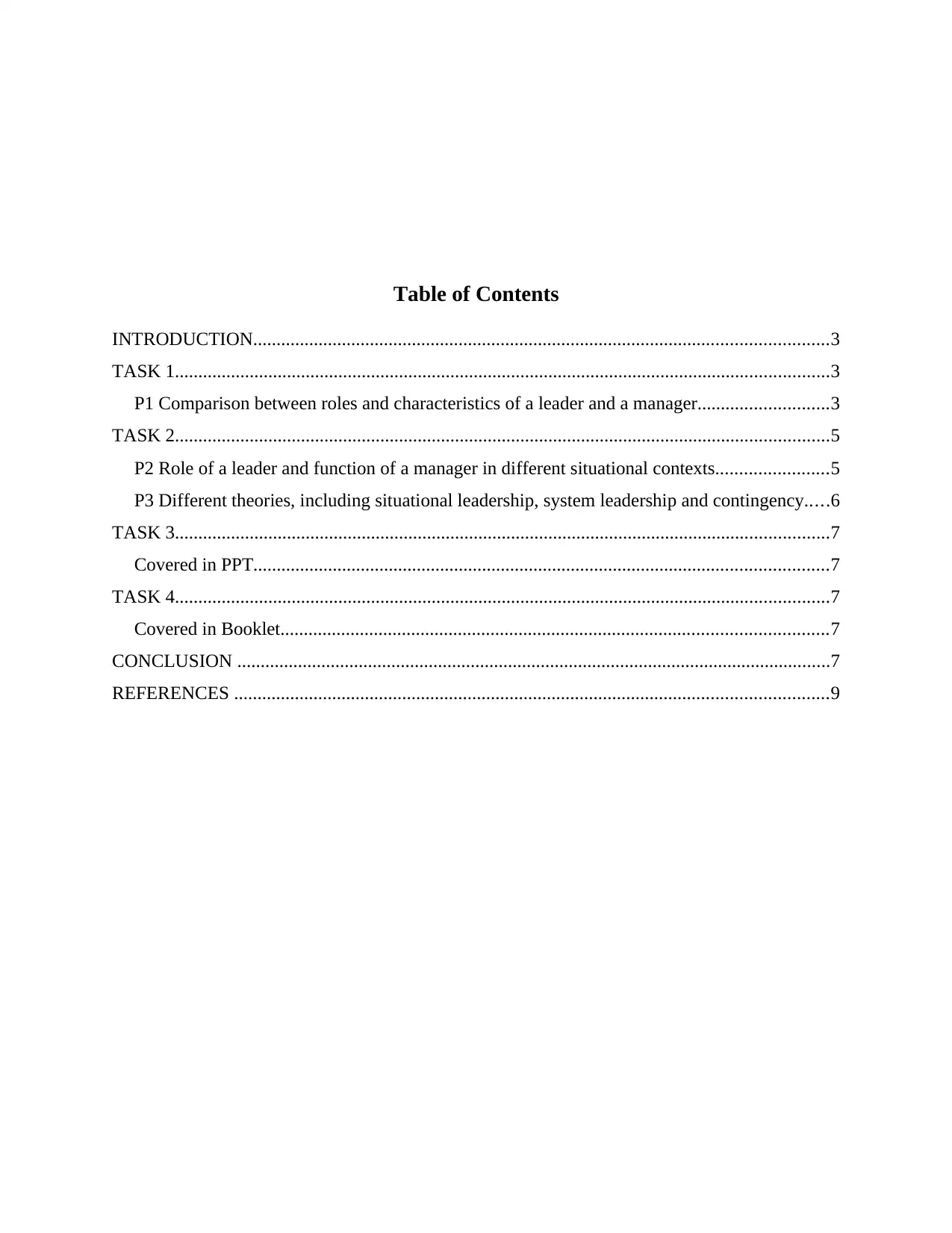
Table of Contents
INTRODUCTION...........................................................................................................................3
TASK 1............................................................................................................................................3
P1 Comparison between roles and characteristics of a leader and a manager............................3
TASK 2............................................................................................................................................5
P2 Role of a leader and function of a manager in different situational contexts........................5
P3 Different theories, including situational leadership, system leadership and contingency.....6
TASK 3............................................................................................................................................7
Covered in PPT...........................................................................................................................7
TASK 4............................................................................................................................................7
Covered in Booklet.....................................................................................................................7
CONCLUSION ...............................................................................................................................7
REFERENCES ...............................................................................................................................9
INTRODUCTION...........................................................................................................................3
TASK 1............................................................................................................................................3
P1 Comparison between roles and characteristics of a leader and a manager............................3
TASK 2............................................................................................................................................5
P2 Role of a leader and function of a manager in different situational contexts........................5
P3 Different theories, including situational leadership, system leadership and contingency.....6
TASK 3............................................................................................................................................7
Covered in PPT...........................................................................................................................7
TASK 4............................................................................................................................................7
Covered in Booklet.....................................................................................................................7
CONCLUSION ...............................................................................................................................7
REFERENCES ...............................................................................................................................9
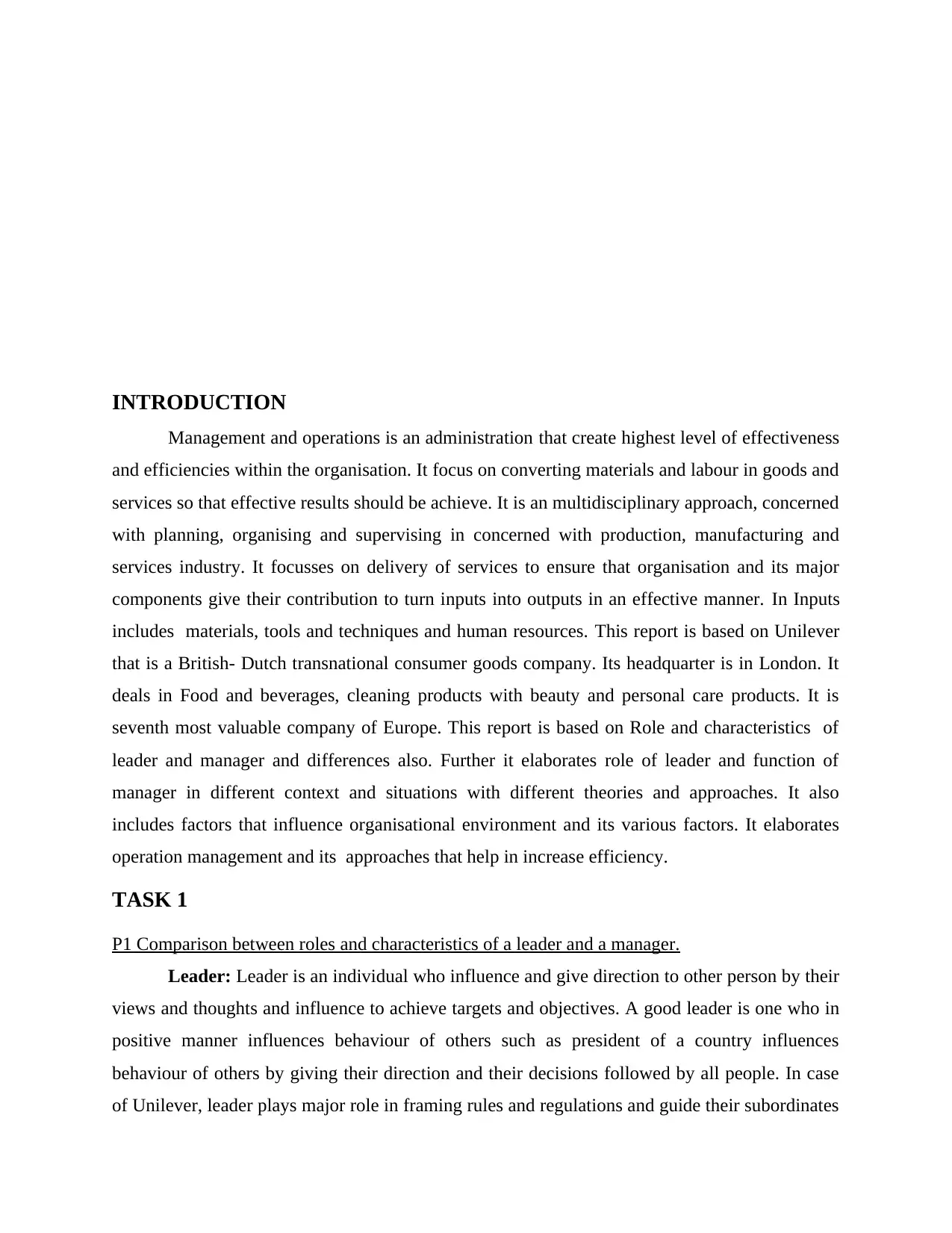
INTRODUCTION
Management and operations is an administration that create highest level of effectiveness
and efficiencies within the organisation. It focus on converting materials and labour in goods and
services so that effective results should be achieve. It is an multidisciplinary approach, concerned
with planning, organising and supervising in concerned with production, manufacturing and
services industry. It focusses on delivery of services to ensure that organisation and its major
components give their contribution to turn inputs into outputs in an effective manner. In Inputs
includes materials, tools and techniques and human resources. This report is based on Unilever
that is a British- Dutch transnational consumer goods company. Its headquarter is in London. It
deals in Food and beverages, cleaning products with beauty and personal care products. It is
seventh most valuable company of Europe. This report is based on Role and characteristics of
leader and manager and differences also. Further it elaborates role of leader and function of
manager in different context and situations with different theories and approaches. It also
includes factors that influence organisational environment and its various factors. It elaborates
operation management and its approaches that help in increase efficiency.
TASK 1
P1 Comparison between roles and characteristics of a leader and a manager.
Leader: Leader is an individual who influence and give direction to other person by their
views and thoughts and influence to achieve targets and objectives. A good leader is one who in
positive manner influences behaviour of others such as president of a country influences
behaviour of others by giving their direction and their decisions followed by all people. In case
of Unilever, leader plays major role in framing rules and regulations and guide their subordinates
Management and operations is an administration that create highest level of effectiveness
and efficiencies within the organisation. It focus on converting materials and labour in goods and
services so that effective results should be achieve. It is an multidisciplinary approach, concerned
with planning, organising and supervising in concerned with production, manufacturing and
services industry. It focusses on delivery of services to ensure that organisation and its major
components give their contribution to turn inputs into outputs in an effective manner. In Inputs
includes materials, tools and techniques and human resources. This report is based on Unilever
that is a British- Dutch transnational consumer goods company. Its headquarter is in London. It
deals in Food and beverages, cleaning products with beauty and personal care products. It is
seventh most valuable company of Europe. This report is based on Role and characteristics of
leader and manager and differences also. Further it elaborates role of leader and function of
manager in different context and situations with different theories and approaches. It also
includes factors that influence organisational environment and its various factors. It elaborates
operation management and its approaches that help in increase efficiency.
TASK 1
P1 Comparison between roles and characteristics of a leader and a manager.
Leader: Leader is an individual who influence and give direction to other person by their
views and thoughts and influence to achieve targets and objectives. A good leader is one who in
positive manner influences behaviour of others such as president of a country influences
behaviour of others by giving their direction and their decisions followed by all people. In case
of Unilever, leader plays major role in framing rules and regulations and guide their subordinates
⊘ This is a preview!⊘
Do you want full access?
Subscribe today to unlock all pages.

Trusted by 1+ million students worldwide
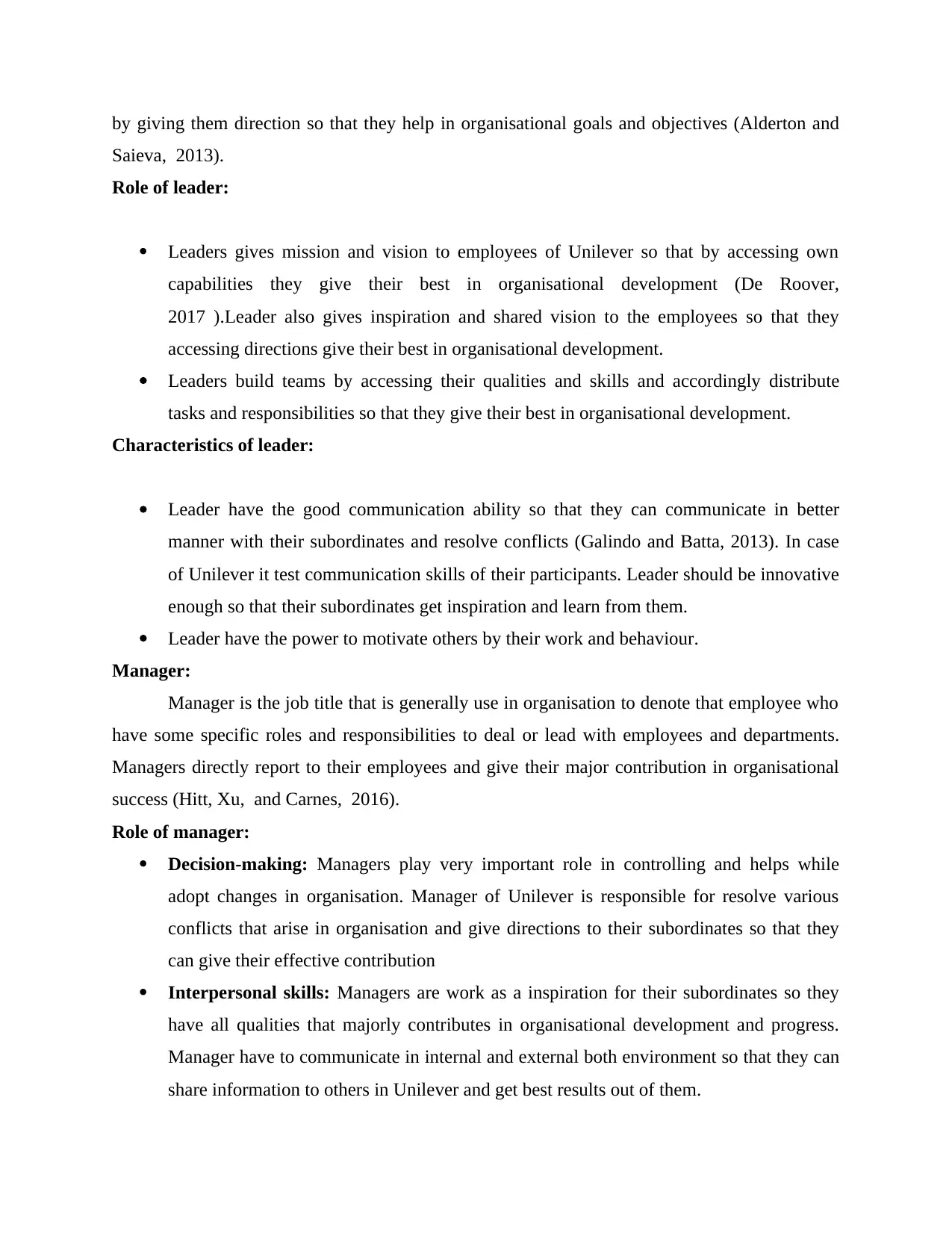
by giving them direction so that they help in organisational goals and objectives (Alderton and
Saieva, 2013).
Role of leader:
Leaders gives mission and vision to employees of Unilever so that by accessing own
capabilities they give their best in organisational development (De Roover,
2017 ).Leader also gives inspiration and shared vision to the employees so that they
accessing directions give their best in organisational development.
Leaders build teams by accessing their qualities and skills and accordingly distribute
tasks and responsibilities so that they give their best in organisational development.
Characteristics of leader:
Leader have the good communication ability so that they can communicate in better
manner with their subordinates and resolve conflicts (Galindo and Batta, 2013). In case
of Unilever it test communication skills of their participants. Leader should be innovative
enough so that their subordinates get inspiration and learn from them.
Leader have the power to motivate others by their work and behaviour.
Manager:
Manager is the job title that is generally use in organisation to denote that employee who
have some specific roles and responsibilities to deal or lead with employees and departments.
Managers directly report to their employees and give their major contribution in organisational
success (Hitt, Xu, and Carnes, 2016).
Role of manager:
Decision-making: Managers play very important role in controlling and helps while
adopt changes in organisation. Manager of Unilever is responsible for resolve various
conflicts that arise in organisation and give directions to their subordinates so that they
can give their effective contribution
Interpersonal skills: Managers are work as a inspiration for their subordinates so they
have all qualities that majorly contributes in organisational development and progress.
Manager have to communicate in internal and external both environment so that they can
share information to others in Unilever and get best results out of them.
Saieva, 2013).
Role of leader:
Leaders gives mission and vision to employees of Unilever so that by accessing own
capabilities they give their best in organisational development (De Roover,
2017 ).Leader also gives inspiration and shared vision to the employees so that they
accessing directions give their best in organisational development.
Leaders build teams by accessing their qualities and skills and accordingly distribute
tasks and responsibilities so that they give their best in organisational development.
Characteristics of leader:
Leader have the good communication ability so that they can communicate in better
manner with their subordinates and resolve conflicts (Galindo and Batta, 2013). In case
of Unilever it test communication skills of their participants. Leader should be innovative
enough so that their subordinates get inspiration and learn from them.
Leader have the power to motivate others by their work and behaviour.
Manager:
Manager is the job title that is generally use in organisation to denote that employee who
have some specific roles and responsibilities to deal or lead with employees and departments.
Managers directly report to their employees and give their major contribution in organisational
success (Hitt, Xu, and Carnes, 2016).
Role of manager:
Decision-making: Managers play very important role in controlling and helps while
adopt changes in organisation. Manager of Unilever is responsible for resolve various
conflicts that arise in organisation and give directions to their subordinates so that they
can give their effective contribution
Interpersonal skills: Managers are work as a inspiration for their subordinates so they
have all qualities that majorly contributes in organisational development and progress.
Manager have to communicate in internal and external both environment so that they can
share information to others in Unilever and get best results out of them.
Paraphrase This Document
Need a fresh take? Get an instant paraphrase of this document with our AI Paraphraser
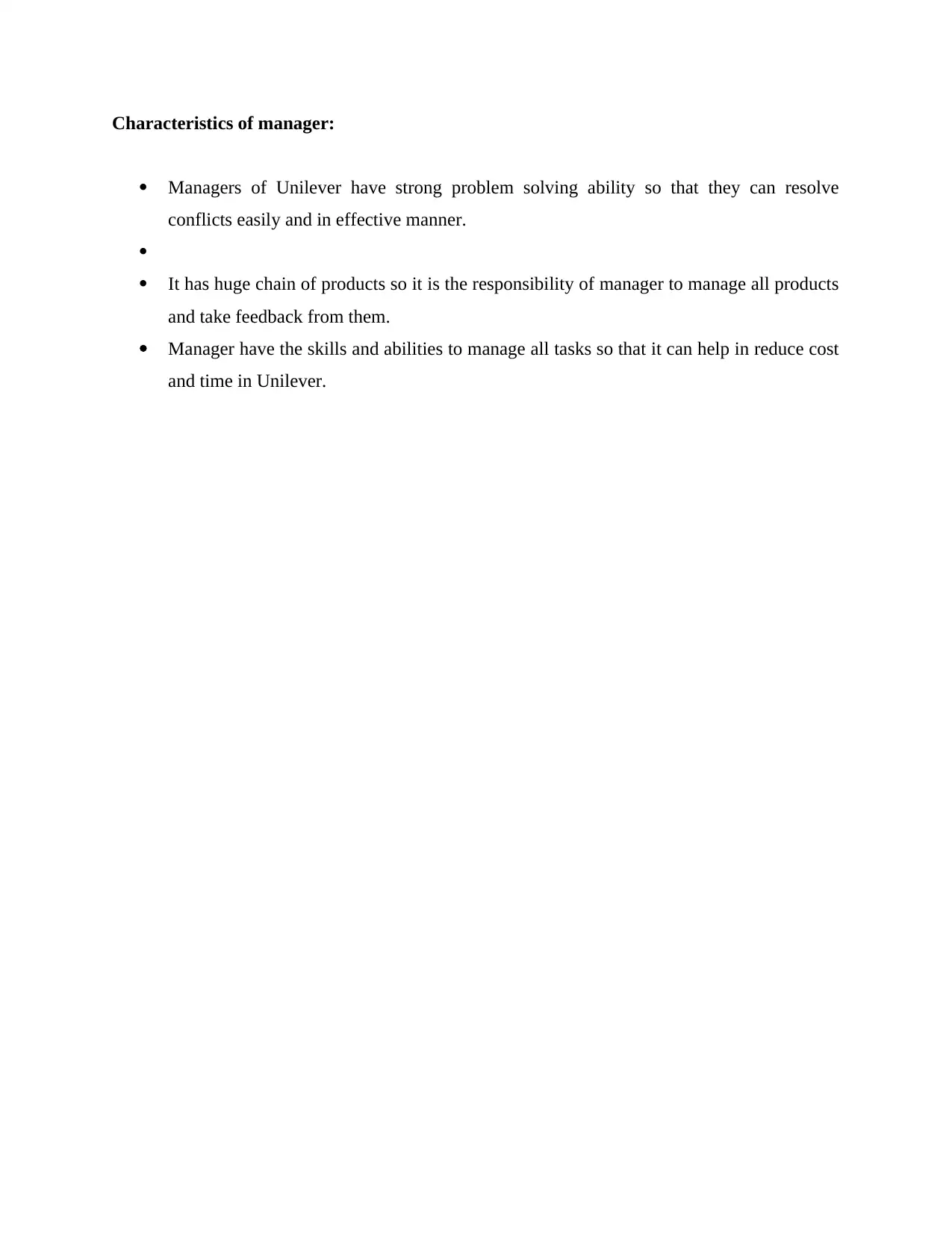
Characteristics of manager:
Managers of Unilever have strong problem solving ability so that they can resolve
conflicts easily and in effective manner.
It has huge chain of products so it is the responsibility of manager to manage all products
and take feedback from them.
Manager have the skills and abilities to manage all tasks so that it can help in reduce cost
and time in Unilever.
Managers of Unilever have strong problem solving ability so that they can resolve
conflicts easily and in effective manner.
It has huge chain of products so it is the responsibility of manager to manage all products
and take feedback from them.
Manager have the skills and abilities to manage all tasks so that it can help in reduce cost
and time in Unilever.
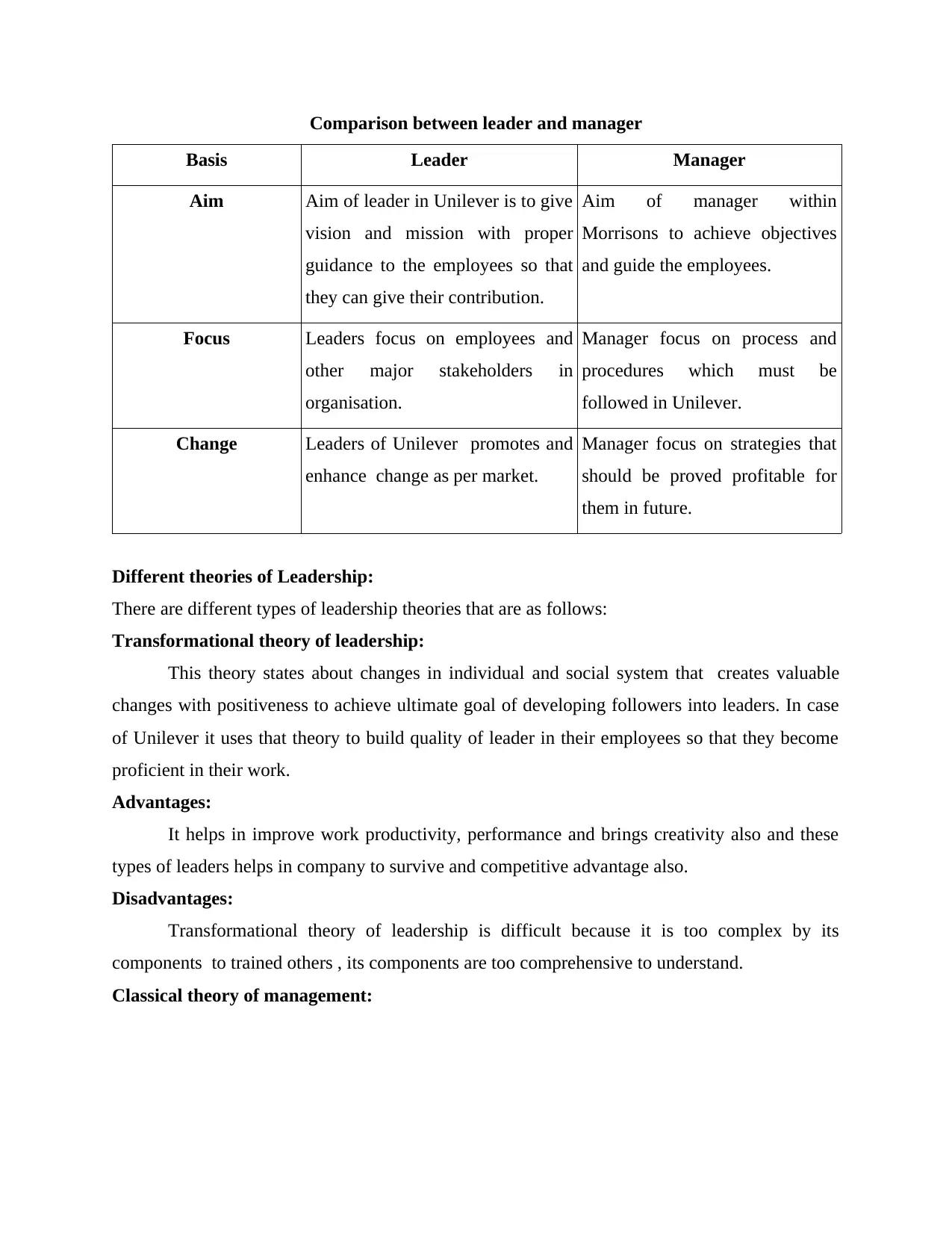
Comparison between leader and manager
Basis Leader Manager
Aim Aim of leader in Unilever is to give
vision and mission with proper
guidance to the employees so that
they can give their contribution.
Aim of manager within
Morrisons to achieve objectives
and guide the employees.
Focus Leaders focus on employees and
other major stakeholders in
organisation.
Manager focus on process and
procedures which must be
followed in Unilever.
Change Leaders of Unilever promotes and
enhance change as per market.
Manager focus on strategies that
should be proved profitable for
them in future.
Different theories of Leadership:
There are different types of leadership theories that are as follows:
Transformational theory of leadership:
This theory states about changes in individual and social system that creates valuable
changes with positiveness to achieve ultimate goal of developing followers into leaders. In case
of Unilever it uses that theory to build quality of leader in their employees so that they become
proficient in their work.
Advantages:
It helps in improve work productivity, performance and brings creativity also and these
types of leaders helps in company to survive and competitive advantage also.
Disadvantages:
Transformational theory of leadership is difficult because it is too complex by its
components to trained others , its components are too comprehensive to understand.
Classical theory of management:
Basis Leader Manager
Aim Aim of leader in Unilever is to give
vision and mission with proper
guidance to the employees so that
they can give their contribution.
Aim of manager within
Morrisons to achieve objectives
and guide the employees.
Focus Leaders focus on employees and
other major stakeholders in
organisation.
Manager focus on process and
procedures which must be
followed in Unilever.
Change Leaders of Unilever promotes and
enhance change as per market.
Manager focus on strategies that
should be proved profitable for
them in future.
Different theories of Leadership:
There are different types of leadership theories that are as follows:
Transformational theory of leadership:
This theory states about changes in individual and social system that creates valuable
changes with positiveness to achieve ultimate goal of developing followers into leaders. In case
of Unilever it uses that theory to build quality of leader in their employees so that they become
proficient in their work.
Advantages:
It helps in improve work productivity, performance and brings creativity also and these
types of leaders helps in company to survive and competitive advantage also.
Disadvantages:
Transformational theory of leadership is difficult because it is too complex by its
components to trained others , its components are too comprehensive to understand.
Classical theory of management:
⊘ This is a preview!⊘
Do you want full access?
Subscribe today to unlock all pages.

Trusted by 1+ million students worldwide
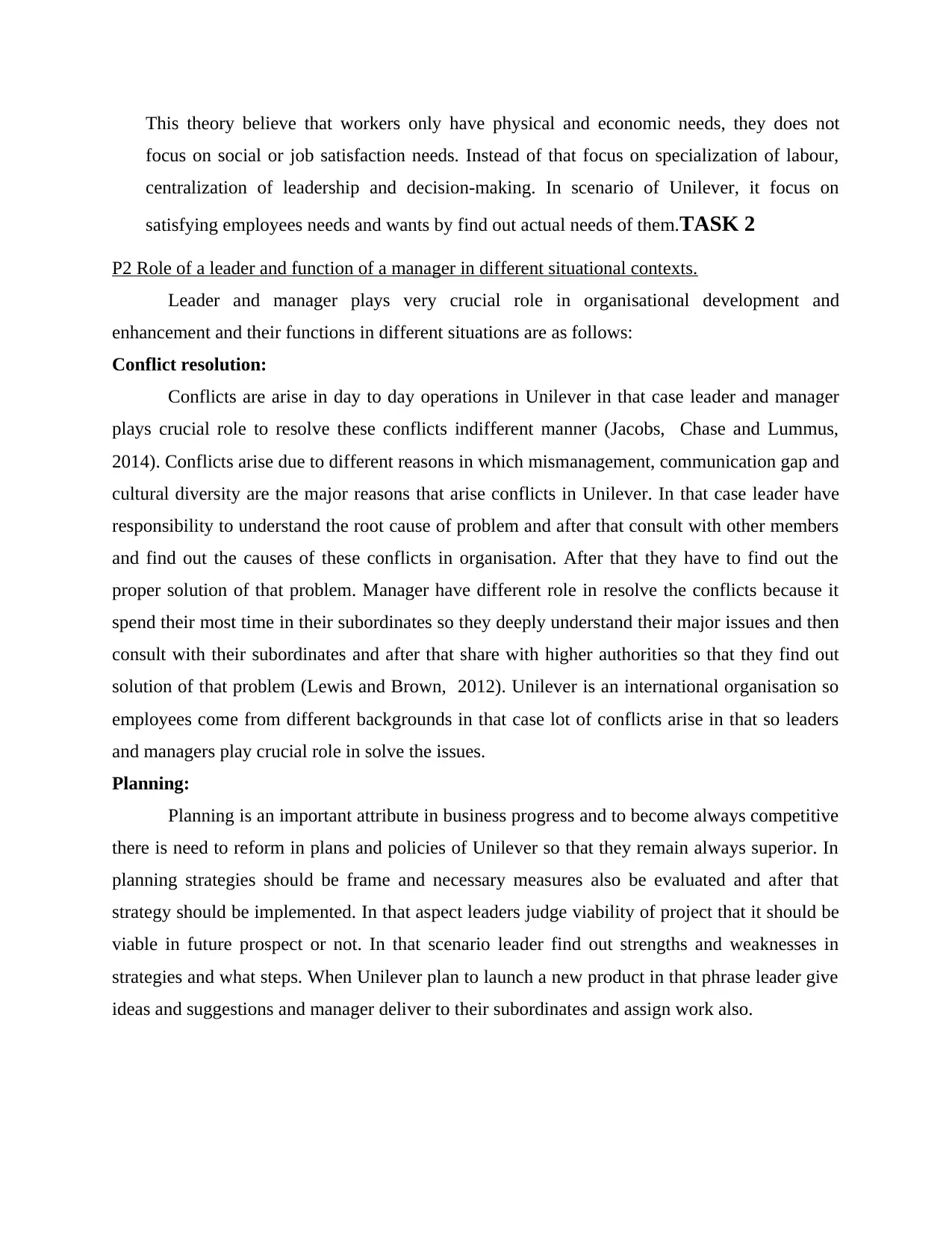
This theory believe that workers only have physical and economic needs, they does not
focus on social or job satisfaction needs. Instead of that focus on specialization of labour,
centralization of leadership and decision-making. In scenario of Unilever, it focus on
satisfying employees needs and wants by find out actual needs of them.TASK 2
P2 Role of a leader and function of a manager in different situational contexts.
Leader and manager plays very crucial role in organisational development and
enhancement and their functions in different situations are as follows:
Conflict resolution:
Conflicts are arise in day to day operations in Unilever in that case leader and manager
plays crucial role to resolve these conflicts indifferent manner (Jacobs, Chase and Lummus,
2014). Conflicts arise due to different reasons in which mismanagement, communication gap and
cultural diversity are the major reasons that arise conflicts in Unilever. In that case leader have
responsibility to understand the root cause of problem and after that consult with other members
and find out the causes of these conflicts in organisation. After that they have to find out the
proper solution of that problem. Manager have different role in resolve the conflicts because it
spend their most time in their subordinates so they deeply understand their major issues and then
consult with their subordinates and after that share with higher authorities so that they find out
solution of that problem (Lewis and Brown, 2012). Unilever is an international organisation so
employees come from different backgrounds in that case lot of conflicts arise in that so leaders
and managers play crucial role in solve the issues.
Planning:
Planning is an important attribute in business progress and to become always competitive
there is need to reform in plans and policies of Unilever so that they remain always superior. In
planning strategies should be frame and necessary measures also be evaluated and after that
strategy should be implemented. In that aspect leaders judge viability of project that it should be
viable in future prospect or not. In that scenario leader find out strengths and weaknesses in
strategies and what steps. When Unilever plan to launch a new product in that phrase leader give
ideas and suggestions and manager deliver to their subordinates and assign work also.
focus on social or job satisfaction needs. Instead of that focus on specialization of labour,
centralization of leadership and decision-making. In scenario of Unilever, it focus on
satisfying employees needs and wants by find out actual needs of them.TASK 2
P2 Role of a leader and function of a manager in different situational contexts.
Leader and manager plays very crucial role in organisational development and
enhancement and their functions in different situations are as follows:
Conflict resolution:
Conflicts are arise in day to day operations in Unilever in that case leader and manager
plays crucial role to resolve these conflicts indifferent manner (Jacobs, Chase and Lummus,
2014). Conflicts arise due to different reasons in which mismanagement, communication gap and
cultural diversity are the major reasons that arise conflicts in Unilever. In that case leader have
responsibility to understand the root cause of problem and after that consult with other members
and find out the causes of these conflicts in organisation. After that they have to find out the
proper solution of that problem. Manager have different role in resolve the conflicts because it
spend their most time in their subordinates so they deeply understand their major issues and then
consult with their subordinates and after that share with higher authorities so that they find out
solution of that problem (Lewis and Brown, 2012). Unilever is an international organisation so
employees come from different backgrounds in that case lot of conflicts arise in that so leaders
and managers play crucial role in solve the issues.
Planning:
Planning is an important attribute in business progress and to become always competitive
there is need to reform in plans and policies of Unilever so that they remain always superior. In
planning strategies should be frame and necessary measures also be evaluated and after that
strategy should be implemented. In that aspect leaders judge viability of project that it should be
viable in future prospect or not. In that scenario leader find out strengths and weaknesses in
strategies and what steps. When Unilever plan to launch a new product in that phrase leader give
ideas and suggestions and manager deliver to their subordinates and assign work also.
Paraphrase This Document
Need a fresh take? Get an instant paraphrase of this document with our AI Paraphraser
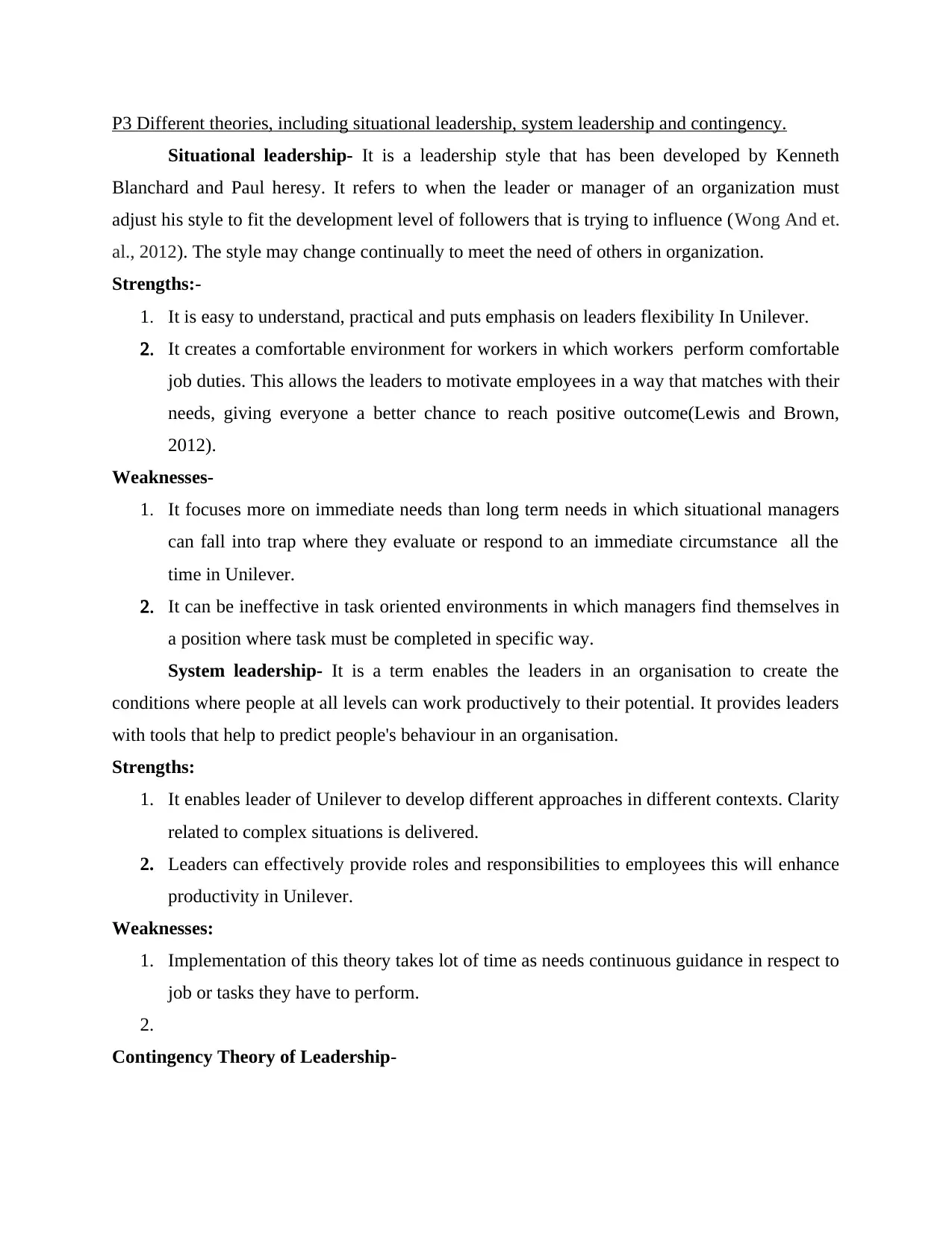
P3 Different theories, including situational leadership, system leadership and contingency.
Situational leadership- It is a leadership style that has been developed by Kenneth
Blanchard and Paul heresy. It refers to when the leader or manager of an organization must
adjust his style to fit the development level of followers that is trying to influence (Wong And et.
al., 2012). The style may change continually to meet the need of others in organization.
Strengths:-
1. It is easy to understand, practical and puts emphasis on leaders flexibility In Unilever.
2. It creates a comfortable environment for workers in which workers perform comfortable
job duties. This allows the leaders to motivate employees in a way that matches with their
needs, giving everyone a better chance to reach positive outcome(Lewis and Brown,
2012).
Weaknesses-
1. It focuses more on immediate needs than long term needs in which situational managers
can fall into trap where they evaluate or respond to an immediate circumstance all the
time in Unilever.
2. It can be ineffective in task oriented environments in which managers find themselves in
a position where task must be completed in specific way.
System leadership- It is a term enables the leaders in an organisation to create the
conditions where people at all levels can work productively to their potential. It provides leaders
with tools that help to predict people's behaviour in an organisation.
Strengths:
1. It enables leader of Unilever to develop different approaches in different contexts. Clarity
related to complex situations is delivered.
2. Leaders can effectively provide roles and responsibilities to employees this will enhance
productivity in Unilever.
Weaknesses:
1. Implementation of this theory takes lot of time as needs continuous guidance in respect to
job or tasks they have to perform.
2.
Contingency Theory of Leadership-
Situational leadership- It is a leadership style that has been developed by Kenneth
Blanchard and Paul heresy. It refers to when the leader or manager of an organization must
adjust his style to fit the development level of followers that is trying to influence (Wong And et.
al., 2012). The style may change continually to meet the need of others in organization.
Strengths:-
1. It is easy to understand, practical and puts emphasis on leaders flexibility In Unilever.
2. It creates a comfortable environment for workers in which workers perform comfortable
job duties. This allows the leaders to motivate employees in a way that matches with their
needs, giving everyone a better chance to reach positive outcome(Lewis and Brown,
2012).
Weaknesses-
1. It focuses more on immediate needs than long term needs in which situational managers
can fall into trap where they evaluate or respond to an immediate circumstance all the
time in Unilever.
2. It can be ineffective in task oriented environments in which managers find themselves in
a position where task must be completed in specific way.
System leadership- It is a term enables the leaders in an organisation to create the
conditions where people at all levels can work productively to their potential. It provides leaders
with tools that help to predict people's behaviour in an organisation.
Strengths:
1. It enables leader of Unilever to develop different approaches in different contexts. Clarity
related to complex situations is delivered.
2. Leaders can effectively provide roles and responsibilities to employees this will enhance
productivity in Unilever.
Weaknesses:
1. Implementation of this theory takes lot of time as needs continuous guidance in respect to
job or tasks they have to perform.
2.
Contingency Theory of Leadership-
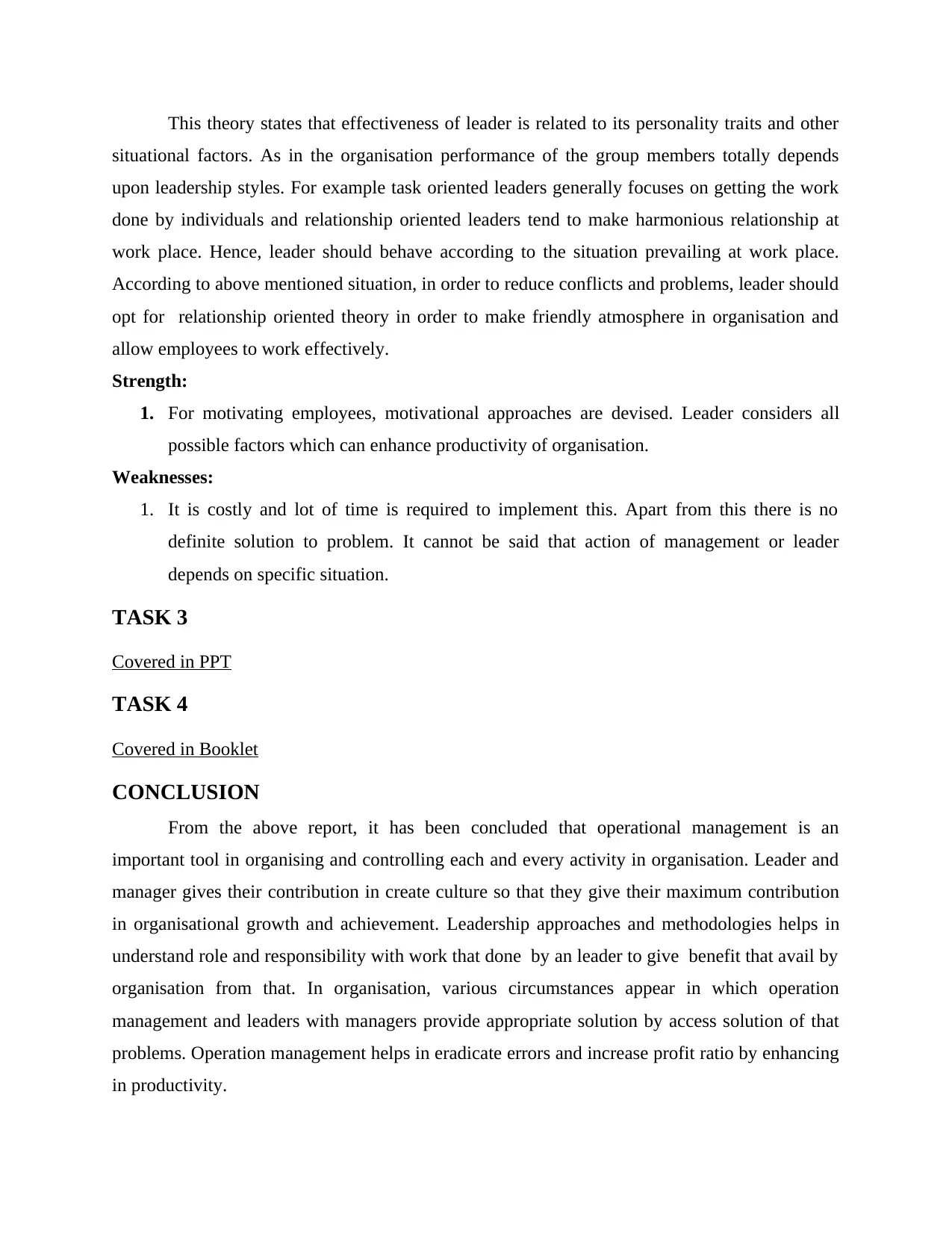
This theory states that effectiveness of leader is related to its personality traits and other
situational factors. As in the organisation performance of the group members totally depends
upon leadership styles. For example task oriented leaders generally focuses on getting the work
done by individuals and relationship oriented leaders tend to make harmonious relationship at
work place. Hence, leader should behave according to the situation prevailing at work place.
According to above mentioned situation, in order to reduce conflicts and problems, leader should
opt for relationship oriented theory in order to make friendly atmosphere in organisation and
allow employees to work effectively.
Strength:
1. For motivating employees, motivational approaches are devised. Leader considers all
possible factors which can enhance productivity of organisation.
Weaknesses:
1. It is costly and lot of time is required to implement this. Apart from this there is no
definite solution to problem. It cannot be said that action of management or leader
depends on specific situation.
TASK 3
Covered in PPT
TASK 4
Covered in Booklet
CONCLUSION
From the above report, it has been concluded that operational management is an
important tool in organising and controlling each and every activity in organisation. Leader and
manager gives their contribution in create culture so that they give their maximum contribution
in organisational growth and achievement. Leadership approaches and methodologies helps in
understand role and responsibility with work that done by an leader to give benefit that avail by
organisation from that. In organisation, various circumstances appear in which operation
management and leaders with managers provide appropriate solution by access solution of that
problems. Operation management helps in eradicate errors and increase profit ratio by enhancing
in productivity.
situational factors. As in the organisation performance of the group members totally depends
upon leadership styles. For example task oriented leaders generally focuses on getting the work
done by individuals and relationship oriented leaders tend to make harmonious relationship at
work place. Hence, leader should behave according to the situation prevailing at work place.
According to above mentioned situation, in order to reduce conflicts and problems, leader should
opt for relationship oriented theory in order to make friendly atmosphere in organisation and
allow employees to work effectively.
Strength:
1. For motivating employees, motivational approaches are devised. Leader considers all
possible factors which can enhance productivity of organisation.
Weaknesses:
1. It is costly and lot of time is required to implement this. Apart from this there is no
definite solution to problem. It cannot be said that action of management or leader
depends on specific situation.
TASK 3
Covered in PPT
TASK 4
Covered in Booklet
CONCLUSION
From the above report, it has been concluded that operational management is an
important tool in organising and controlling each and every activity in organisation. Leader and
manager gives their contribution in create culture so that they give their maximum contribution
in organisational growth and achievement. Leadership approaches and methodologies helps in
understand role and responsibility with work that done by an leader to give benefit that avail by
organisation from that. In organisation, various circumstances appear in which operation
management and leaders with managers provide appropriate solution by access solution of that
problems. Operation management helps in eradicate errors and increase profit ratio by enhancing
in productivity.
⊘ This is a preview!⊘
Do you want full access?
Subscribe today to unlock all pages.

Trusted by 1+ million students worldwide
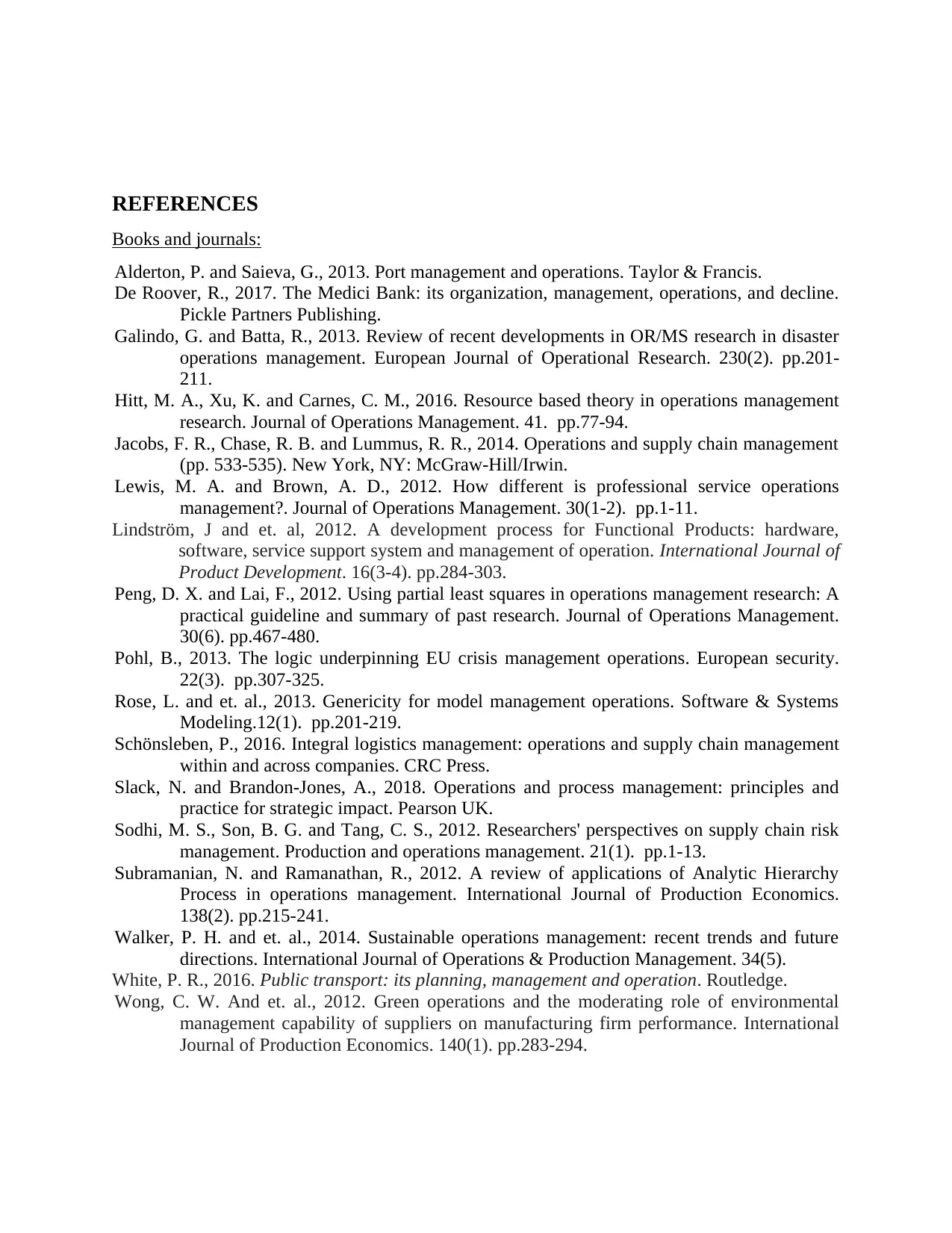
REFERENCES
Books and journals:
Alderton, P. and Saieva, G., 2013. Port management and operations. Taylor & Francis.
De Roover, R., 2017. The Medici Bank: its organization, management, operations, and decline.
Pickle Partners Publishing.
Galindo, G. and Batta, R., 2013. Review of recent developments in OR/MS research in disaster
operations management. European Journal of Operational Research. 230(2). pp.201-
211.
Hitt, M. A., Xu, K. and Carnes, C. M., 2016. Resource based theory in operations management
research. Journal of Operations Management. 41. pp.77-94.
Jacobs, F. R., Chase, R. B. and Lummus, R. R., 2014. Operations and supply chain management
(pp. 533-535). New York, NY: McGraw-Hill/Irwin.
Lewis, M. A. and Brown, A. D., 2012. How different is professional service operations
management?. Journal of Operations Management. 30(1-2). pp.1-11.
Lindström, J and et. al, 2012. A development process for Functional Products: hardware,
software, service support system and management of operation. International Journal of
Product Development. 16(3-4). pp.284-303.
Peng, D. X. and Lai, F., 2012. Using partial least squares in operations management research: A
practical guideline and summary of past research. Journal of Operations Management.
30(6). pp.467-480.
Pohl, B., 2013. The logic underpinning EU crisis management operations. European security.
22(3). pp.307-325.
Rose, L. and et. al., 2013. Genericity for model management operations. Software & Systems
Modeling.12(1). pp.201-219.
Schönsleben, P., 2016. Integral logistics management: operations and supply chain management
within and across companies. CRC Press.
Slack, N. and Brandon-Jones, A., 2018. Operations and process management: principles and
practice for strategic impact. Pearson UK.
Sodhi, M. S., Son, B. G. and Tang, C. S., 2012. Researchers' perspectives on supply chain risk
management. Production and operations management. 21(1). pp.1-13.
Subramanian, N. and Ramanathan, R., 2012. A review of applications of Analytic Hierarchy
Process in operations management. International Journal of Production Economics.
138(2). pp.215-241.
Walker, P. H. and et. al., 2014. Sustainable operations management: recent trends and future
directions. International Journal of Operations & Production Management. 34(5).
White, P. R., 2016. Public transport: its planning, management and operation. Routledge.
Wong, C. W. And et. al., 2012. Green operations and the moderating role of environmental
management capability of suppliers on manufacturing firm performance. International
Journal of Production Economics. 140(1). pp.283-294.
Books and journals:
Alderton, P. and Saieva, G., 2013. Port management and operations. Taylor & Francis.
De Roover, R., 2017. The Medici Bank: its organization, management, operations, and decline.
Pickle Partners Publishing.
Galindo, G. and Batta, R., 2013. Review of recent developments in OR/MS research in disaster
operations management. European Journal of Operational Research. 230(2). pp.201-
211.
Hitt, M. A., Xu, K. and Carnes, C. M., 2016. Resource based theory in operations management
research. Journal of Operations Management. 41. pp.77-94.
Jacobs, F. R., Chase, R. B. and Lummus, R. R., 2014. Operations and supply chain management
(pp. 533-535). New York, NY: McGraw-Hill/Irwin.
Lewis, M. A. and Brown, A. D., 2012. How different is professional service operations
management?. Journal of Operations Management. 30(1-2). pp.1-11.
Lindström, J and et. al, 2012. A development process for Functional Products: hardware,
software, service support system and management of operation. International Journal of
Product Development. 16(3-4). pp.284-303.
Peng, D. X. and Lai, F., 2012. Using partial least squares in operations management research: A
practical guideline and summary of past research. Journal of Operations Management.
30(6). pp.467-480.
Pohl, B., 2013. The logic underpinning EU crisis management operations. European security.
22(3). pp.307-325.
Rose, L. and et. al., 2013. Genericity for model management operations. Software & Systems
Modeling.12(1). pp.201-219.
Schönsleben, P., 2016. Integral logistics management: operations and supply chain management
within and across companies. CRC Press.
Slack, N. and Brandon-Jones, A., 2018. Operations and process management: principles and
practice for strategic impact. Pearson UK.
Sodhi, M. S., Son, B. G. and Tang, C. S., 2012. Researchers' perspectives on supply chain risk
management. Production and operations management. 21(1). pp.1-13.
Subramanian, N. and Ramanathan, R., 2012. A review of applications of Analytic Hierarchy
Process in operations management. International Journal of Production Economics.
138(2). pp.215-241.
Walker, P. H. and et. al., 2014. Sustainable operations management: recent trends and future
directions. International Journal of Operations & Production Management. 34(5).
White, P. R., 2016. Public transport: its planning, management and operation. Routledge.
Wong, C. W. And et. al., 2012. Green operations and the moderating role of environmental
management capability of suppliers on manufacturing firm performance. International
Journal of Production Economics. 140(1). pp.283-294.
Paraphrase This Document
Need a fresh take? Get an instant paraphrase of this document with our AI Paraphraser
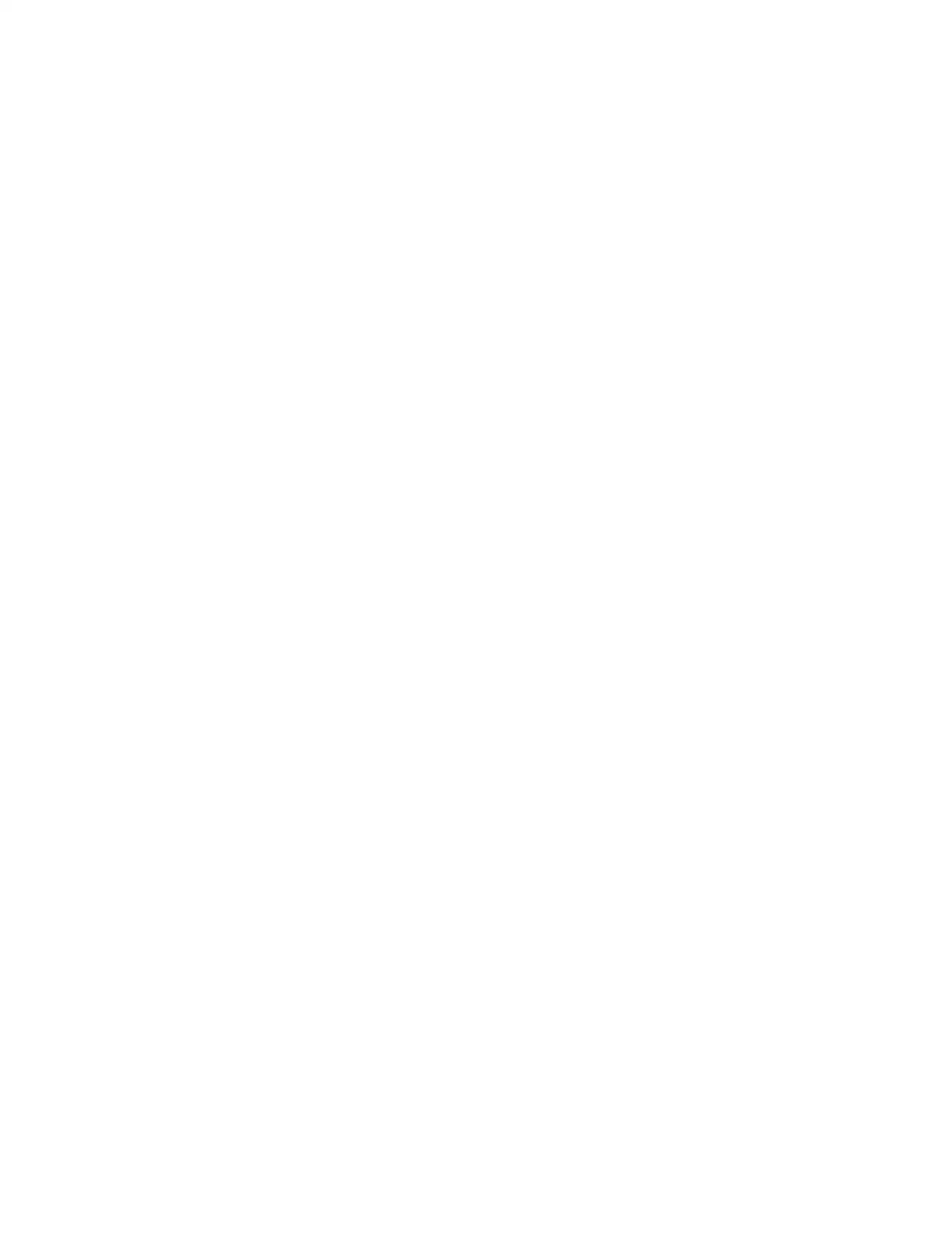
1 out of 11
Related Documents
Your All-in-One AI-Powered Toolkit for Academic Success.
+13062052269
info@desklib.com
Available 24*7 on WhatsApp / Email
![[object Object]](/_next/static/media/star-bottom.7253800d.svg)
Unlock your academic potential
Copyright © 2020–2026 A2Z Services. All Rights Reserved. Developed and managed by ZUCOL.





